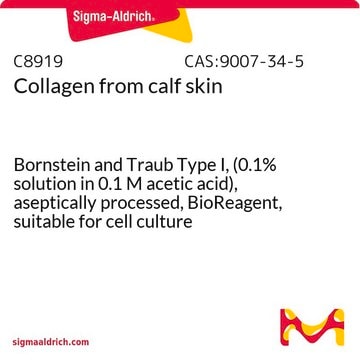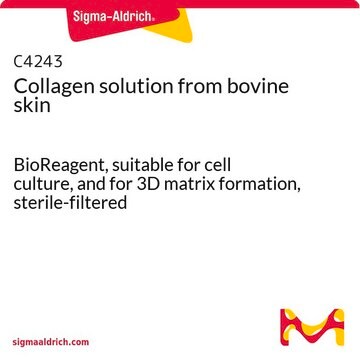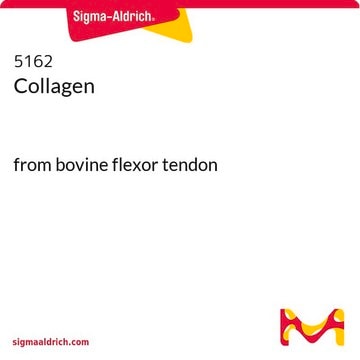C5608
Collagen from rabbit skin
Bornstein and Traub Type I, powder
Sign Into View Organizational & Contract Pricing
All Photos(1)
About This Item
Recommended Products
biological source
rabbit skin
Quality Level
description
acid soluble
form
powder
technique(s)
cell culture | stem cell: suitable
solubility
aqueous acid: ≤10 mg/mL
aqueous sodium acetate buffer: soluble (0.01-0.5M)
UniProt accession no.
storage temp.
2-8°C
Gene Information
rabbit ... COL1A2(100008997)
General description
Collagen is classified into a number of structurally and genetically distinct types. We use the nomenclature proposed by Bornstein and Traub. Do not confuse Sigma type designations with recognized collagen classification types.
Application
Collagen-type 1 may be used in research of Idiopathic pulmonary fibrosis (IPF). Robust expression of collagen-type 1 is one distinctive feature of IPF. Additionally, collagen-type 1 has been used in studies on the effect of endoplasmic reticulum (ER) stress from IPF on myofibroblastic differentiation of lung fibroblasts. Collage-type 1 soluble in acidic solution produces three dimensional scaffolding useful in bioengineering and cell culture applications where biomaterials are needed to replace native collagen extracellular matrices.
Collagen Type I has been used as a scaffold for the growth in vitro of stem cells in a wide variety of biomaterial engineering studies.
Collagen Type I has been used as a scaffold for the growth in vitro of stem cells in a wide variety of biomaterial engineering studies.
Preparation Note
Prepared with modification of Gallop, P.M.
Storage Class Code
11 - Combustible Solids
WGK
WGK 1
Flash Point(F)
Not applicable
Flash Point(C)
Not applicable
Personal Protective Equipment
dust mask type N95 (US), Eyeshields, Gloves
Certificates of Analysis (COA)
Search for Certificates of Analysis (COA) by entering the products Lot/Batch Number. Lot and Batch Numbers can be found on a product’s label following the words ‘Lot’ or ‘Batch’.
Already Own This Product?
Find documentation for the products that you have recently purchased in the Document Library.
Customers Also Viewed
Prasad L Polavarapu et al.
Chirality, 23(9), 801-807 (2011-12-03)
Fourier transform infrared vibrational circular dichroism (FTIR-VCD) measurements have gone through major advances in the last decade. A major thrust in these advances was to find ways that can minimize the VCD spectral artifacts and obtain the VCD signals at
Katarina Wolf et al.
The Journal of cell biology, 201(7), 1069-1084 (2013-06-27)
Cell migration through 3D tissue depends on a physicochemical balance between cell deformability and physical tissue constraints. Migration rates are further governed by the capacity to degrade ECM by proteolytic enzymes, particularly matrix metalloproteinases (MMPs), and integrin- and actomyosin-mediated mechanocoupling.
Emily Hams et al.
Proceedings of the National Academy of Sciences of the United States of America, 111(1), 367-372 (2013-12-18)
Disease conditions associated with pulmonary fibrosis are progressive and have a poor long-term prognosis with irreversible changes in airway architecture leading to marked morbidity and mortalities. Using murine models we demonstrate a role for interleukin (IL)-25 in the generation of
Caroline Forsell et al.
The Annals of thoracic surgery, 98(1), 65-71 (2014-06-03)
The prevalence for thoracic aortic aneurysms (TAAs) is significantly increased in patients with a bicuspid aortic valve (BAV) compared with patients who have a normal tricuspid aortic valve (TAV). TAA rupture is a life-threatening event, and biomechanics-based simulations of the
Maurits L van Montfoort et al.
Arteriosclerosis, thrombosis, and vascular biology, 34(8), 1668-1673 (2014-06-21)
Coagulation factor XI is proposed as therapeutic target for anticoagulation. However, it is still unclear whether the antithrombotic properties of factor XI inhibitors influence atherosclerotic disease and atherothrombosis. Our aim is to investigate whether factor XI antisense oligonucleotides could prevent
Our team of scientists has experience in all areas of research including Life Science, Material Science, Chemical Synthesis, Chromatography, Analytical and many others.
Contact Technical Service








